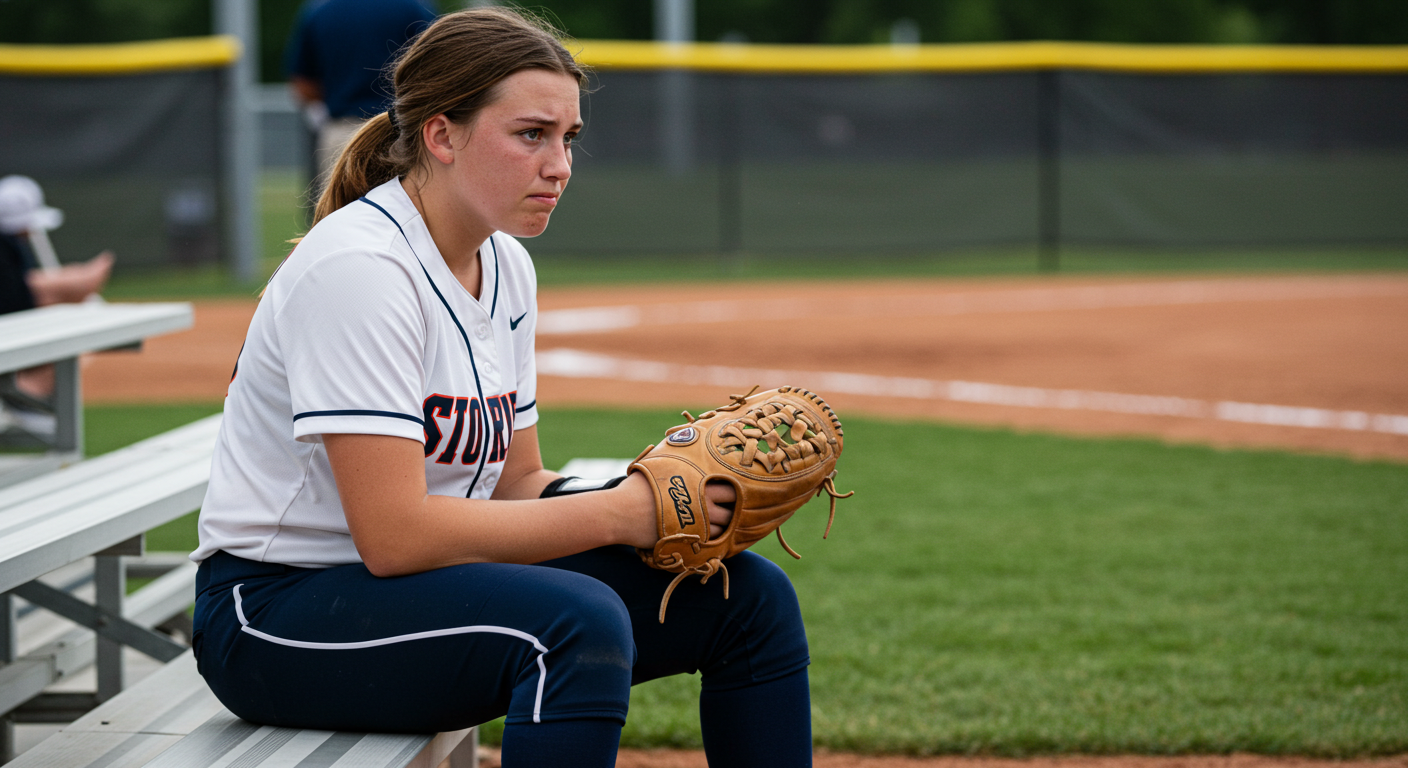Welcome to the Brain & Faith Blog
This is where neuroscience and Scripture meet to bring clarity, calm, and confidence into everyday life. From brain health tips and faith-based practices to practical support for parents of young athletes, you’ll find simple, actionable steps to strengthen your mind, nurture your spirit, and guide your family toward lasting peace and resilience.

The Fear of Failure: How Parents Can Help Athletes Embrace Risk
The Invisible Prison That's Destroying Athletic Potential
Your child has the skills. They've put in the practice hours. They know what to do. But when it matters most, they play it safe. They avoid the aggressive move that could win the point. They choose the conservative play instead of the game-changing risk. They perform well in practice but shrink during competition.
This isn't a lack of ability or preparation. This is fear of failure, and it's becoming epidemic among young athletes. The very fear that's supposed to motivate them to work harder is actually preventing them from performing at their potential when it counts.
Here's what most parents don't understand: fear of failure doesn't just affect performance. It rewires your child's brain to avoid challenge, seek safety over growth, and ultimately limits their potential in every area of life. The mental patterns they develop in sports become the blueprint for how they approach academic challenges, career opportunities, and personal relationships.
But there's hope. Fear of failure isn't a permanent personality trait. It's a learned response that can be unlearned. When you understand how fear of failure develops and what you can do to help your child embrace appropriate risk-taking, you can transform not just their athletic performance, but their entire approach to life's challenges.
Understanding Fear of Failure in Young Athletes
Fear of failure in sports isn't the same as being nervous before a big game. Normal pre-competition nerves can actually enhance performance by increasing focus and energy. Fear of failure, however, is the belief that making mistakes or losing will result in catastrophic consequences that threaten the child's sense of safety, belonging, or worth.
The Root of Athletic Fear of Failure
Young athletes develop fear of failure when they learn that their mistakes or poor performances result in negative consequences they can't handle. These consequences might include disappointing parents, losing playing time, facing criticism from coaches, or being rejected by teammates.
The fear becomes entrenched when children begin to believe that their athletic performance determines their value as a person. When winning means they're worthy of love and attention, and losing means they're disappointing or inadequate, every competition becomes a threat to their fundamental sense of self.
How Fear of Failure Shows Up in Sports
You can recognize fear of failure in your young athlete through specific behavioral patterns. They become overly cautious during competition, avoiding the aggressive plays or risky techniques that could lead to breakthrough performances. They may perform well in low-stakes situations but struggle when the pressure increases.
Fear-driven athletes often show physical tension that interferes with their natural movement patterns. They overthink their technique, second-guess their instincts, and become paralyzed by analysis during moments that require quick, decisive action.
Emotionally, these athletes may become perfectionistic, setting impossibly high standards for themselves and becoming devastated by normal mistakes that are part of learning and competition. They may also develop anxiety symptoms before competitions or even avoid challenging opponents or situations where failure is possible.
The Neuroscience of Risk and Fear in Young Athletes
Understanding what happens in your child's brain when they're afraid of failure can help you respond more effectively to their struggles.
The Fear-Based Brain
When your child is afraid of failure, their amygdala (the brain's alarm system) interprets competitive situations as threats to their safety. This triggers the release of stress hormones like cortisol and adrenaline, which prepare the body for fight, flight, or freeze responses.
While these hormones can enhance performance in short bursts, chronic activation impairs the prefrontal cortex, the brain region responsible for decision-making, creativity, and accessing learned skills. This is why fear-driven athletes often can't access their training during competition, even though they perform beautifully in practice.
The Risk-Taking Brain
When young athletes feel safe to take appropriate risks, their brains operate very differently. The prefrontal cortex remains online, allowing them to make good decisions, adapt to changing situations, and access their full range of skills and knowledge.
Risk-taking in this context doesn't mean being reckless. It means being willing to attempt challenging techniques, compete aggressively against strong opponents, and push beyond their comfort zone in pursuit of improvement and excellence.
The Critical Role of Parents in Fear Development
As a parent, you have enormous influence over whether your child develops a healthy relationship with risk and failure or becomes paralyzed by fear. Often, this influence operates through subtle messages and reactions that you may not even realize you're sending.
How Parents Accidentally Create Fear of Failure
The most common way parents create fear of failure is by reacting emotionally to their child's mistakes or poor performances. When you become visibly upset, disappointed, or frustrated after a loss or error, you're teaching your child that their athletic failures cause you pain.
Children are biologically programmed to seek their parents' approval and avoid causing them distress. When your emotional state depends on their performance, they learn that taking risks that might lead to failure is dangerous because it threatens their relationship with you.
Comments like "You should have made that shot" or "I know you can do better than that" seem motivational, but they actually increase fear of failure by implying that their current performance is inadequate and that you expect them to be perfect.
Comparing your child to other players, discussing their mistakes in detail, or expressing disappointment about missed opportunities all reinforce the message that failure is unacceptable and that their worth depends on their athletic success.
How Parents Can Encourage Healthy Risk-Taking
Creating an environment where your child feels safe to take risks starts with separating their athletic performance from your emotional reactions. This means maintaining the same level of love, support, and pride in them regardless of how they perform.
Focus your attention and praise on their effort, courage, and willingness to challenge themselves rather than on their results. When they attempt a difficult technique or compete aggressively against a strong opponent, celebrate their boldness regardless of whether they succeed.
Help them understand that mistakes and failures are not just acceptable, but necessary for growth and improvement. Share stories of professional athletes who failed spectacularly before achieving greatness, and help them see setbacks as information rather than judgments about their worth.
Practical Strategies for Overcoming Fear of Failure
Reframe Failure as Learning
Help your child develop a growth mindset by teaching them to view failures and mistakes as valuable learning opportunities rather than threats to their worth. After a disappointing performance, ask questions like "What did you learn from that experience?" or "What would you do differently next time?"
Create a family culture where mistakes are discussed openly and without shame. Share your own failures and what you learned from them. This normalizes the experience of failure and helps your child understand that everyone struggles and makes mistakes.
Practice Risk-Taking in Low-Stakes Situations
Help your child build their risk-taking muscles by encouraging them to try new techniques or strategies during practice or in less important competitions. When they take these risks, focus your feedback on their courage and willingness to push their boundaries rather than on whether they succeeded.
Set process goals that encourage risk-taking, such as "attempt three aggressive shots" or "try that new technique we've been practicing" rather than outcome goals like "score 15 points" or "win the match."
Develop Failure Recovery Skills
Teach your child specific techniques for bouncing back quickly from mistakes or failures. This might include deep breathing exercises, positive self-talk phrases, or physical routines that help them refocus after setbacks.
Practice these recovery techniques during low-pressure situations so they become automatic during competition. When your child uses these skills successfully, acknowledge their mental toughness and resilience.
Build Identity Beyond Athletics
Help your child develop a strong sense of identity that extends far beyond their athletic achievements. Encourage their interests in academics, arts, community service, or other activities that allow them to experience success and build confidence in multiple areas.
When their self-worth isn't entirely dependent on athletic performance, they feel safer taking risks in sports because failure doesn't threaten their entire sense of self.
The Difference Between Healthy and Unhealthy Risk-Taking
It's important to distinguish between the kind of risk-taking that leads to growth and improvement and reckless behavior that can lead to injury or poor decision-making.
Healthy Athletic Risk-Taking
Healthy risk-taking in sports involves making calculated decisions to push beyond comfort zones in pursuit of improvement or competitive advantage. This includes attempting challenging techniques they've practiced, competing aggressively against strong opponents, and trying new strategies that might give them an edge.
Healthy risk-taking is based on preparation, confidence in their abilities, and a clear understanding of potential consequences. These athletes take risks because they believe in their ability to handle whatever happens, not because they're trying to prove something or avoid negative emotions.
Unhealthy Risk-Taking
Unhealthy risk-taking, on the other hand, involves reckless behavior that ignores safety considerations or appropriate preparation. This might include attempting techniques they haven't mastered, playing through serious injuries, or making impulsive decisions based on emotion rather than strategy.
Sometimes, what appears to be risk-taking is actually another form of fear-based behavior. Athletes who consistently make reckless choices may be trying to avoid the anxiety of careful preparation or the responsibility that comes with thoughtful decision-making.
Creating a Family Culture That Embraces Growth
Model Healthy Risk-Taking Yourself
Children learn more from what they observe than from what they're told. Show your child what healthy risk-taking looks like by pursuing your own challenges, sharing your failures and what you learned from them, and demonstrating resilience when things don't go as planned.
Talk about times when you took risks that didn't work out and how those experiences contributed to your growth and development. This helps normalize failure and shows them that successful people regularly face setbacks.
Celebrate Effort and Courage
Make effort and courage the primary focus of your attention and praise rather than results or natural talent. When your child attempts something difficult, acknowledge their bravery regardless of the outcome.
Create family traditions around celebrating growth and learning rather than just victories. This might include discussing what everyone learned each week or sharing stories about times when failure led to important insights.
Maintain Perspective About Sports
Help your child understand that sports are one part of their development, not the most important part. While athletic participation can teach valuable life skills, their worth as a person and their future success don't depend on their sports achievements.
This perspective gives them the emotional freedom to take risks and learn from failures because the stakes feel manageable rather than life-threatening.
The Long-Term Benefits of Embracing Risk
When young athletes learn to embrace appropriate risk-taking, they develop skills and mindsets that serve them throughout their lives. They become more creative problem-solvers, more resilient in the face of setbacks, and more willing to pursue challenging opportunities in academics, careers, and relationships.
Building Resilience Through Sports
Athletes who learn to take risks and recover from failures develop exceptional resilience. They understand that setbacks are temporary and that their response to failure matters more than the failure itself.
This resilience becomes a competitive advantage not just in sports, but in every area of life. They're more likely to pursue challenging academic programs, start their own businesses, and take on leadership roles because they're not paralyzed by the possibility of failure.
Developing Leadership Qualities
Young athletes who embrace risk often become natural leaders because they're willing to make difficult decisions, try new approaches, and take responsibility for outcomes. They inspire others through their courage and their ability to bounce back from setbacks.
These leadership qualities serve them well in team sports and carry over into their schools, communities, and eventual careers.
When Fear of Failure Becomes Serious**
While some nervousness and concern about performance is normal, fear of failure becomes a serious problem when it significantly interferes with your child's performance, enjoyment, or well-being.
Warning Signs That Require Professional Help
Seek professional support if your child shows persistent anxiety that interferes with their daily functioning, avoids competitions or quits sports entirely due to fear, develops physical symptoms like panic attacks or chronic stomach problems before competitions, or shows signs of depression or withdrawal from activities they once enjoyed.
A sports psychologist or mental health professional who specializes in working with young athletes can provide specific strategies and support for overcoming severe fear of failure.
Your Role in Your Child's Relationship with Risk
As a sports parent, you have the power to either fuel your child's fear of failure or help them develop a healthy relationship with risk and challenge. The choice you make will influence not just their athletic career, but their entire approach to life's opportunities and obstacles.
Remember that your child is watching how you handle your own failures and setbacks. They're learning from your reactions to their performances and your attitudes about challenge and growth. The environment you create at home and on the sidelines becomes the foundation for their relationship with risk and failure.
The Bigger Picture
Helping your child overcome fear of failure in sports is about much more than athletic performance. You're teaching them how to approach challenges with courage, how to learn from setbacks, and how to maintain their sense of worth regardless of outcomes.
These lessons will serve them when they face academic challenges, career decisions, relationship difficulties, and all the other risks and opportunities that life presents. The confidence and resilience they develop through sports becomes the foundation for a life lived with purpose and courage.
Taking the Next Step
Helping your child overcome fear of failure and embrace healthy risk-taking requires you to examine your own relationship with their success and failure. It means learning to manage your own anxiety about their performance and creating an environment where they feel safe to make mistakes and learn from them.
This work can be challenging, especially when you're dealing with your own fears about their future, your investment in their success, or your need to see them achieve their potential. The pressure you feel as a sports parent can make it difficult to provide the calm, supportive presence they need to develop courage and resilience.
If you find yourself getting anxious about your child's performance, struggling to maintain perspective about their athletic journey, or feeling overwhelmed by the emotional demands of sports parenting, you're not alone. Learning to manage your own stress and fears while supporting your young athlete is one of the most challenging aspects of parenting.
In a free 30-minute consultation, we can explore the specific fears and pressures you're facing as a sports parent, discuss strategies for creating an environment where your child feels safe to take risks and learn from failures, and develop a plan for supporting their growth while maintaining your own emotional well-being.
Because when you're grounded in your own peace and clear about your role in their development, you naturally create the conditions where your child can develop the courage, resilience, and confidence they need to thrive both in sports and in life. The foundation you build now will influence how they approach every challenge they face in the years ahead.
Brain Health Matters, LLC
Helping busy minds find peace through faith and neuroscience.
© 2025 Brain Health Matters, LLC. All rights reserved.
Terms & Conditions

